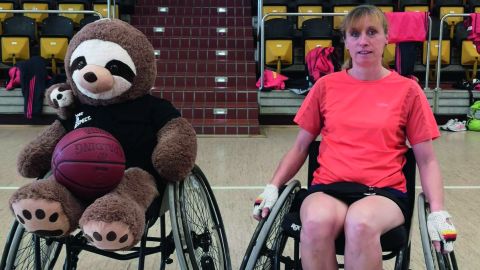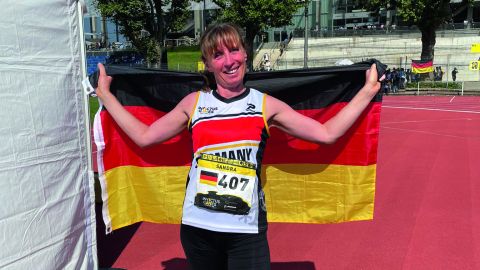Police chief inspector Sandra Winkler (54) has no memory of the day that divided her life into a life before and a life after. It was December 27, 2017 and they were waiting on the hard shoulder of the A 61 with their blue lights flashing - she, her colleague and the trainee. Because no one from the highway police was around at the time, the patrol from the Viersen municipal police was supposed to pull an apparently drunk truck driver out of traffic.
Winkler's mind is blank, a protective mechanism. She no longer has any images of the moment when the 40-ton truck crashed into her, killing her colleague, seriously injuring the trainee and endangering her own life. The images that accompany her today are different. Those of the long, arduous road back to life and service. And the best pictures are the most recent, the highlight, the reward for all her efforts: the pictures of her participation in the Invictus sports competitions. They took place in Düsseldorf in September under the motto "A Home for Respect".
Invictus comes from the Latin and means undefeated. Undefeated by what the participants have experienced in their service. Most of them are soldiers who have been severely injured during their deployment, either physically or mentally, often both. This year, for the first time, firefighters and police officers who did not come out of a mission unscathed also took part in the games. Prince Harry founded the Invictus Games in 2014, when they were held in London, before moving on to Orlando, Toronto, Sydney and The Hague.
Sandra Winkler was one of only three German police officers and the only state police officer to take part in Düsseldorf. "A goosebump experience", as she says. Because of the waving flags, because of the 20,000 spectators in the Düsseldorf arena when the 22 nations marched in. And because Winkler always thinks of her colleague who was killed when she does what she has done since the accident to fight her way back into everyday life through sport. "She watches me from above and says: That's exactly right."
Winkler had a traumatic brain injury, a brain haemorrhage and both collarbones were broken. She attributes the fact that she survived to her basic fitness, sport, which has always been her passion. Especially running. She used to take part in police championships, sprint and middle distance, at state and even national level. In the first year after the accident, she was not allowed to run at all because of the concussions. The doctors wouldn't allow her to do more than walk. But just as she worked her way back into her job - today she works in the traffic commissioner's office in Willich on the Lower Rhine - so too did she return to her sport.
In 2019, she ran her first 5-kilometre race under 30 minutes, shortly afterwards she ran under 25 again and at some point her head of HR asked her if she would like to take part in the Invictus Games. They would take place right on her doorstep in Düsseldorf in 2023. Winkler took part in selection tests, passed them, completed an eleven-week training camp at the Bundeswehr Sports School in Warendorf and registered for four sports: Middle distance over 1,500 meters and over 800 meters. In addition: indoor rowing, discus throw and long jump.
On September 9, the time had come: she was there in the stadium when Prince Harry gave the opening speech, and in this case, Winkler says, being there really was everything. Of course, she is still annoyed that she missed out on bronze by six centimeters in the discus throw. But that's not what the Invictus Games are about. Everyone who takes part has already won. Because they have overcome strokes of fate or at least taken up the fight against them so that they don't let them destroy the rest of their lives.

